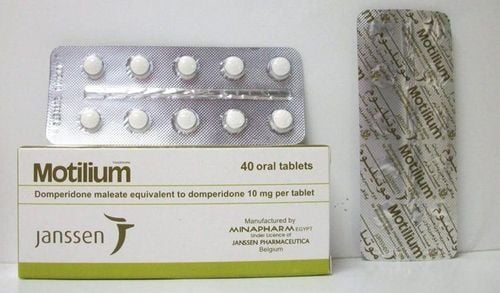This is an automatically translated article.
The article was professionally consulted by Specialist Doctor Obstetrician and Gynecologist - Department of Obstetrics and Gynecology, Vinmec Hai Phong International General Hospital
Morning sickness is a collection of extremely uncomfortable symptoms caused by physiological hormonal changes during pregnancy. Severe morning sickness can adversely affect the health of pregnant women.
1. What is morning sickness due to pregnancy?
Morning sickness is a collection of unpleasant symptoms that occur in the early stages of pregnancy. Among them, the most prominent symptoms are nausea and vomiting. Between 50% and 90% of pregnant women experience bouts of nausea and vomiting every day when experiencing morning sickness. However, only 1% of them are actually considered severe morning sickness and require medical help.
The cause of morning sickness in pregnancy has so far not found a clear mechanism. Some theories have been put forward to be due to physiological hormonal changes during pregnancy. In particular, when the level of progesterone increases, it will relax the muscles of the digestive system, leading to food in the stomach being pushed up into the esophagus, creating a feeling of nausea. This substance also makes food in the stomach digested more slowly than usual, causing indigestion. In addition, some women with a sensitive nervous system will react very strongly to changes in the body, especially during pregnancy.
Trắc nghiệm: Bạn có hiểu đúng về dấu hiệu mang thai sớm?
Các dấu hiệu mang thai sớm không phải chỉ mỗi trễ kinh mà còn có rất nhiều dấu hiệu khác như xuất huyết âm đạo, ngực căng tức,… Điểm xem bạn biết được bao nhiêu dấu hiệu mang thai sớm thông qua bài trắc nghiệm này nhé!
2. When did morning sickness start?
The timing of the first signs of morning sickness varies from one woman to another. However, most women begin to experience discomfort as pregnancy begins about halfway through the first trimester, between the sixth and eighth weeks of gestation.
In other words, pregnant women have absolutely no abnormal symptoms before the sixth week. And this also means that the first sudden vomiting in the morning after a missed period is a sign that you are pregnant.

3. Morning sickness is usually the worst at what stage?
Morning sickness during pregnancy is also known as "morning sickness" because the symptoms are often severe when you first wake up. However, most pregnant women can be affected at any time of the day, especially when there is stimulation of smell, taste of food or even sound, light, crowded places. Not only that, pregnant women also experience a loss of appetite, often feel tired, lack of energy, cannot focus on anything other than feeling nausea, headache, dizziness, sleep disturbance. sleep...
Peaks of these disturbances also vary from woman to woman, but are mostly concentrated around the ninth week of pregnancy. A number of hypotheses have been put forward to explain this problem because this is the time period for the complete formation of the fetal organs. Under the mobilization of a large amount of raw materials, catalysts, metabolic reactions and growth hormone levels, the "biochemical explosions" cause the mother's body to lose balance and the functioning of the organ systems. since then has also been disturbed.
In addition, it is also important to clearly establish that morning sickness is not a "sign" of good or bad pregnancy and does not reflect anything about the development of the baby as well as help assess the situation. maternal health. However, if the mother has dehydration, severe electrolyte disturbances due to vomiting, severe weight loss is alarming and should be hospitalized for timely intervention. In cases where morning sickness affects the mother's life, an indication to terminate the pregnancy may be given.
4. When does morning sickness end?

After the hard days of pregnancy, most women will feel some relief by week 16. Only a small number (about 10%) will experience nausea and vomiting that persists throughout pregnancy until delivery. .
Therefore, if you still have morning sickness continuously through this time, whether severe or mild, do not try to endure it because it will affect not only your own health but also that of the fetus's development. pediatric. The fetus is prone to long-term failure due to not receiving enough energy from the mother, delayed physical - mental development later. Instead, tell your obstetrician for medical help.
In addition to some drugs prescribed by the doctor, pregnant women should use more herbs or flavors to make the body feel more comfortable, such as lemongrass smell, ginger candy, ginger tea or vitamin supplements, minerals, drink enough water. In addition, a complete convalescence regime, absolutely avoiding stress, anxiety or no longer having to work and thinking will help pregnant women feel comfortable and ease the uncomfortable feeling of morning sickness. In addition, some external physical therapies such as acupuncture, acupressure, hypnosis, massage, continuous muscle relaxation... are also gradually proving effective in treating morning sickness during pregnancy.
In summary, morning sickness is quite common in pregnant women, occurring in the first trimester with a peak in the ninth week. The basic knowledge about this issue will partly help mothers to have a way to "cope", overcome the days of "heavy carrying, painful birth" in the most gentle way to welcome the birth of their baby.
Severe morning sickness often occurs in the 1st trimester, if not timely intervention will cause very dangerous pregnancy poisoning. In addition, this is also the most sensitive time during pregnancy, very easy to miscarry. In order for mother and baby to be healthy, you should have regular antenatal check-ups, especially when morning sickness is getting worse so that the doctor can intervene in a timely manner.
To protect the health of the mother and the fetus comprehensively, Vinmec provides a package Maternity service (12-27-36 weeks), in which the 12-week maternity package helps monitor the mother's health and baby right from the beginning of pregnancy, early detection and timely intervention of health problems. In addition to the usual services, the maternity monitoring program from 12 weeks has special services that other maternity packages do not have such as: Double Test or Triple Test to screen for fetal malformations; Quantitative angiogenesis factor test to diagnose preeclampsia; thyroid screening test; Rubella test; Testing for parasites transmitted from mother to child seriously affects the baby's brain and physical development after birth. After the results of antenatal care and testing are available, doctors will analyze and advise on genetics, nutrition, and a reasonable rest regimen for pregnant women to help mothers and babies have the best health, and develop fetuses. overview.

Please dial HOTLINE for more information or register for an appointment HERE. Download MyVinmec app to make appointments faster and to manage your bookings easily.













